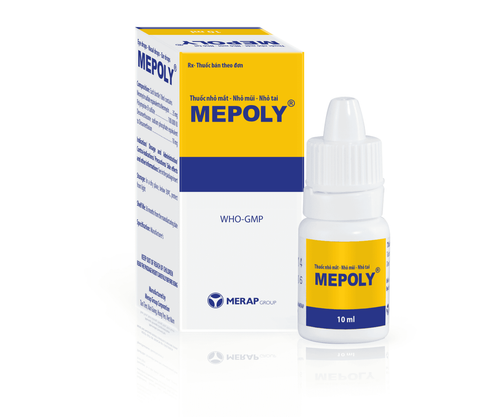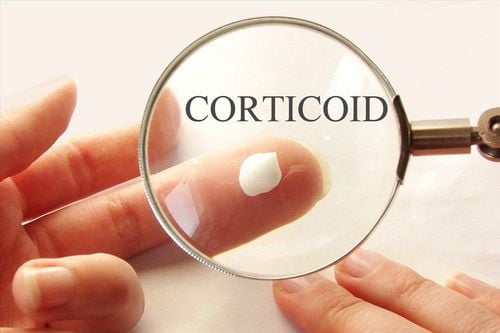This is an automatically translated article.
Aristocort drug is often used to treat dermatological problems such as psoriasis, dermatitis,... To better understand the use of Aristocort drug, what are the side effects, how to use it effectively, please click here. Read refer to the following article.
1. What is Aristocort?
Aristocort has the main ingredient Triamcinolone 0.02% of the group of corticosteroid drugs, made in the form of a tube of 100g topical cream, manufactured by Sigma Pharmaceutical company.
Aristocort Cream also contains the following inactive ingredients:
benzyl alcohol; Wax emulsifier; Isopropyl palmitate; Glycerol; Sorbitol (70% does not crystallize); Lactic acid; Pure water. Aristocort topical also contains an inactive white soft paraffin ingredient. It contains no lanolin, preservatives or colorants.
2. What does Aristocort do? Aristocort topical cream is prescribed by doctors in the following cases:
Treatment of some moderate to severe inflammatory skin diseases, such as various forms of dermatitis and eczema, including dermatitis seborrhea ; Neurodermatitis, caused by repeated rubbing or scratching, chronic inflammatory skin conditions; It is also used to treat otitis externa (inflammation of the outer ear, ear canal), itching of the anus and vulva. Aristocort Cream 0.02% helps relieve symptoms such as itching, redness, dryness, scaling, scaling and discomfort.
3. Contraindications of Aristocort . Topical Cream
You should not use Aristocort Cream if:
Are allergic to Triamcinolone or any of the ingredients in Aristocort Cream; Are pregnant or breast-feeding without discussing it with your doctor; Viral skin infections, skin tuberculosis, acne rosacea (a chronic skin condition), perioral dermatitis (a rash on the face around the mouth), fungal skin infections or ulcers; Have damaged skin. 4. Side effects when using Aristocort Many side effects can occur when you use Aristocort topical medicine.
Common:
Burning, itching or redness of the skin; skin rash; Dry, scaly skin at skin sores; Blisters containing blood on the skin; Visible blood vessels under the skin; Skin color changes; Stretch marks on the skin; Skin is thinner. You should notify your doctor immediately if you experience these conditions:
Back pain; Blurred vision or loss of vision; Purple-red lines on the arms, face, legs, trunk, or genitals; Be swelled the leg; fullness or stomach pain; Eyesore; Torn skin; Unusual bruising; The face is rounder and fuller than usual; Irregular heartbeat, increased blood pressure; Skin irritation around the mouth; Anxiety, irritability, fatigue; Decreased libido or sex drive in men; Nausea or vomiting; More severe infections; Rapid weight gain or loss; Unusual hair loss; Irregular menstruation; signs of an allergic reaction, such as a rash; hives; itchy; red, swollen, blistering, or peeling skin; wheeze; chest or throat tightness; trouble breathing, swallowing, or talking; unusual hoarseness; swelling of the mouth, face, lips, tongue, or throat. Signs of high blood sugar such as confusion, feeling drowsy, thirstier, more hungry, urinating more often, flushing, rapid breathing or fruity breath. Signs of a weak adrenal gland such as severe stomach pain or hangover, dizziness, fainting, muscle weakness, feeling very tired, mood swings, not being hungry, weight loss. Some patients may experience other side effects not listed. So check with your doctor if you notice any symptoms that concern you while using this medicine.
5. Drug interactions
There may be an interaction between Aristocort and topical corticosteroids. If you are taking any medications that contain corticosteroids, talk to your doctor or pharmacist. Depending on the specific circumstances, your doctor may advise you to:
Stop taking one of the medicines; Change to one of the other medications; Change the way you are taking one or both medicines. 6. Precautions when using topical Aristocort When Aristocort is used for a long time on large areas of skin and covered with a bandage, it can cause more medicine to be absorbed into the bloodstream, which increases the risk of side effects. . Therefore, the drug should only be used for a short time and discontinued once the side effects resolve. Use caution when using the drug on the skin near the eyes, make sure the medicine does not get into the eyes because it can lead to increased intraocular pressure. Topical corticosteroids may increase the risk of developing skin infections. Using topical corticosteroids for a long time can cause the skin to thin, soften, or cause stretch marks. This medicine should not be used during pregnancy unless the benefits outweigh the risks It is not known whether Triamcinolone passes into breast milk, so women who are breast-feeding should consult their doctor. doctor before using the drug. Do not use Aristocort on areas of skin that rub together such as under the arms or groin area unless directed by your doctor. 7. How to use Aristocort topical cream effectively Use Aristocort at the dose prescribed by your doctor. Depending on the skin condition and severity, the doctor will give the appropriate dose.
Dosage below is for reference only:
Treatment of dermatitis, eczema, psoriasis in adults: Take a thin layer of medicine and apply it on the affected skin from 2-4 times a day. Treatment of dermatitis, eczema, psoriasis in children: Take a thin layer of medicine and apply it on the damaged skin 2-4 times a day. How to use:
Apply some Aristocort cream to the problem area; Use just enough to cover the area without causing discomfort. Do not rub the medicine on the skin or stretch the skin; If you are using Aristocort cream, use enough to disappear into the skin without leaving any on the skin; If you are using Aristocort ointment, use just enough for a smooth layer over the affected area; Do not use on open wounds, unless directed by your doctor; Wash your hands after using Aristocort. Be careful not to get Aristocort in your eyes. If this happens to you, wash your eyes with water; Do not bandage or wrap the treated area of skin unless your doctor tells you to. Use Aristocort at the same time each day. It is important to use Aristocort exactly as your doctor has directed you to. If you use it less often than necessary, it may not be as effective and your skin problem may not improve. Using it more often than necessary may not improve your skin problem any faster, but may cause or increase side effects.
8. Handling Overdose or Missed Dose If someone has overdosed and has severe symptoms such as passing out or having trouble breathing, call 911 or take the person to the nearest medical facility.
If you miss a dose, use it as soon as you remember. If it is almost time for your next dose, skip the missed dose. Use your next dose at the regular time.
Store medication at room temperature between 59-86 degrees F (15-30 degrees C) away from light and moisture. Do not store in bathroom or refrigerator. Keep medicine out of reach of children and pets.
Do not flush medications down the toilet or pour them down the drain unless instructed to do so. Properly dispose of this product when it is expired or no longer needed.
Above is the information about the use, dosage and usage of Aristocort topical. To ensure safety, patients should carefully read the instructions for use, consult a doctor / pharmacist before use.
Please dial HOTLINE for more information or register for an appointment HERE. Download MyVinmec app to make appointments faster and to manage your bookings easily.
Reference source: drugs.com













